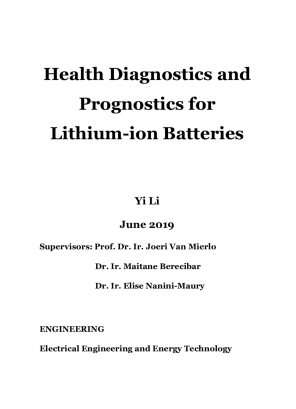
With the wide application of Li-ion batteries as energy storage systems, the concerns on their safety and durability have become the stumbling blocks for their further expansion. The battery performance deteriorates with usage and the accurate battery health diagnostic and prognostic methods are required for the safe and efficient battery utilization. Through the detection of inadequate performance, timely maintenance of the battery system is facilitated, resulting in the reduction of operational costs as well as the prevention of accidents and malfunctions.
This Ph.D dissertation focuses on the identification of Li-ion battery capacity fading. First of all, a comprehensive literature survey on the existing battery health diagnostic and prognostic techniques was performed. The characteristics of different techniques were compared, which provided a foundation for choosing the right methods for online application. The algorithm requirements for a specific application are also addressed in the review. Based on these demands, this dissertation proposes several online- implementable techniques for battery health and prediction.
In this work, two different online battery capacity estimation algorithms were developed with data-driven approach. The first one is based on the incremental capacity (IC) analysis, and the second one uses a machine learning method. IC analysis was applied in this work due to its ability to detect and analysing the battery degradation mechanisms. However, the noisiness on the IC curves is the biggest hurdle for extracting quantitative information for battery health estimation. Herein, a novel feature extraction method was proposed based on Gaussian filtering technique, and the extracted features from IC curves were used as indicators for battery health estimation. With this technique, partial charging voltage curves can be used for battery capacity estimation and the testing time can be reduced significantly to a minimum of 0.8h. The obtained results are accurate with less than 2.5% maximum estimation error and less than 2% average error.
Motivated by the success of applying IC analysis for SOH monitoring, this dissertation further exploits the possibilities of using real-time battery charging data for capacity estimation. A machine learning method based on random forest regression was used for this purpose, and it is the first time that this technique is applied in the field of battery health estimation. The proposed method is applied and validated on different types of batteries with different ageing behaviours. Experimental results show that the proposed technique is able to evaluate the health states of different batteries under varied cycling conditions with good accuracy with a maximum root mean- square error of 1.3%. The proposed method was compared with the existing machine learning method for health estimation, and the result showed that random forest regression can largely decrease the off-line model training time and therefore reduce the computational cost.
Building upon the research on battery health diagnosis, a machine learning method for the battery health prognosis was developed. Gaussian process regression was used, due to its flexibility and ability to provide probabilistic prediction results. Illustrative results demonstrate that the proposed model can achieve reliable short-term prediction results for the tested cells.
